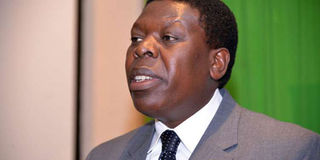Kidero has failed, but Wamalwa talk shows poverty of ideas in Nairobi

The Cabinet Secretary for the Ministry of Water and Irrigation, Eugene Wamalwa, speaks at a media briefing at the InterContinental Hotel Nairobi on June 2, 2016. He has been endorsed for the governorship of Nairobi. PHOTO | SALATON NJAU | NATION MEDIA GROUP
What you need to know:
Jubilee is the same.
Its voting machines will be presented with a candidate cooked up in some boardroom, on the sole basis of their ethnicity, with the opponents forced or bribed to step down.
If voters in the capital city, presumably the most exposed and enlightened in Kenya, are happy to go along with a circus, then we have little scope to complain about the inevitable disappointment that will follow after election day in 2017.
First, an apology. In the run-up to the last General Election, I wrote at length in these pages how Nairobians had to elect Dr Evans Kidero – at the time viewed as a polished corporate titan – and reject the stone-thrower of Embakasi.
What a mistake. Today’s Nairobi looks worse than the worst days of rot and decay in the 1990s when mayors went by names such as "Magic" Mwangi; garbage, crime and potholes were the order of the day and kanjoras were known better for their sure aim with chairs during monthly wars at City Hall than offering services to residents of the capital.
The Nairobi city council was already the wealthiest administration in the country with huge revenue streams from all manner of permits for trading licences, building permits, liquor licenses not to mention parking fees and land rates.
To add to that solid base, devolution has brought in, year on year, the highest allocations for any county in Kenya, rising steadily from Sh11 billion in 2013 to Sh15.3 billion in the current financial year.
How could anyone fail to make a success of devolution in the capital? Walk two minutes from the CBD and you are confronted with the sight of alleyways completely filled with solid waste where just a few years John Gakuo, with far fewer resources, had cleaned up the streets and got the street lights functioning.
Things are far worse in the estates. I would be interested to know in what single area Dr Kidero’s team claims to have succeeded.
Yet the race for governorship in 2017 shows the poverty of our politics and the sheer lack of imagination that underpins electoral democracy in Kenya.
You would think that Nairobians would be debating ideas. That they would be seeking an alternative platform and a comprehensive agenda that offers a clear alternative.
What do we get instead? Nothing but a game of raw ethnic numbers. The poll will be another census with clear echoes of the presidential race.
The debate on the entry of Water minister Eugene Wamalwa sums up the problem. You would think that discussions would center on Wamalwa’s record and an examination of what he stands for or has achieved in the past. What entity has he run that we can judge him by?
HIS ANCESTRY
No. The whole talk has instead been about his ancestry. He is Luhya. He will pull some Luhya votes to the Jubilee side. The message of supporters of another contender, Daniel Waweru, is even more abject. To imagine that people would mount a rostrum to say that the capital city of East Africa’s biggest economy belongs to the Kikuyu just shows the absolute moral and ideological bankruptcy of the political class.
The claim is so bogus as not to require a rebuttal. But the fact a major candidate is running on this platform, a man who wouldn’t turn any heads if he walked into any Nairobi restaurant – such is his obscurity – sums up the trouble with Kenyan politics.
Miguna Miguna, the principled former adviser to the Prime Minister, is running on a very clear ideological platform. He wants to wage a radical war against corruption and introduce clean government. His campaign is yet to gain traction and he is not even included in analysis of the race for governorship, with many of the pieces that have run so far including concocted voter figures. How does anyone know precisely how many members of each ethnic group are on the IEBC register yet the body doesn’t tally ethnic groups?
In his own way, the loutish, rabble-rousing Mike Sonko is another candidate who is not running on an explicitly ethnic platform. His is a Robin Hood lens which pits the poor against the rich. If it ever catches on and replaces ethnicity, there would be a lot to worry about for the upper classes. Johnson Sakaja, another promising contender, will almost certainly be edged out of the race by the powers-that-be. So now the capital is left with a slate of totally uninspiring leading contenders. Cord seems set to stick with what it has. Despite the poor record of Kidero and his team, he can count on the loyal and robotic support of hundreds of thousands of members of communities that support the opposition.
Jubilee is the same. Its voting machines will be presented with a candidate cooked up in some boardroom, on the sole basis of their ethnicity, with the opponents forced or bribed to step down. If voters in the capital city, presumably the most exposed and enlightened in the country, are happy to go along with this circus, then we have little scope to complain about the inevitable disappointment that will follow after election day.
[email protected]; @mutigam





